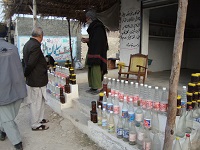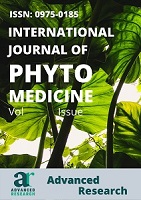Role of Indigenous Arqiyat Distillery in conservation of Rosa species
Keywords:
Indigenous Arqiyat Distillery, Rosa, ConservationAbstract
Cultivation of Rosa damascene in Pakistan is not a common practice. It was a common shrub of salt range and adjacent subtropical zone of Pakistan. Due to over grazing, agricultural expansion, increase in population and habitat loss a lot of its population has lost in the region [4, 5, 6]. Nevertheless, it’s quite abundantly grown in the outskirts of Kallar Kahar Lake where there few distilleries exist since last 300 years. Arqiyat are produced in these distilleries, of which Arqe Gulab is the famous one (Fig. 1 & Fig. 2). Main objective of this short communication is to revealed on traditional and scientific communities that traditional medicinal knowledge and use of such distilleries play a vital role in the conservation of many species including Rosa damascene.
References
Khan, S.M., Page, S., Ahmad, H., Harper, D.M., 2013c. Sustainable utilisation and conservation of plant biodiversity in montane ecosystems; using the Western Himalayas as a case study. Ann. Bot. 112: 479–501, http://dx.doi.org/10.1093/aob/mct125 www.aob.oxfordjournals.org
Khan, S.M., Page S., Ahmad H., et al. 2013. Medicinal flora and ethnoecological knowledge in the Naran Valley, Western Himalaya, Pakistan. Journal of Ethnobiology and Ethnomedicine 9: 4.
Ali, S.I. and M. Qaiser. 1992-2007. Flora of Pakistan, Nos. 194-208. Department of Botany, University of Karachi.
Khan, S.M., Page, S., Ahmad, H., & Harper, D. 2014. Ethno-ecological importance of plant biodiversity in mountain ecosystems with special emphasis on indicator species of a Himalayan Valley in the northern Pakistan. Ecological Indicators, 37: 175-185.
Ahmad, H., Ahmad A, and Jan M.M. 2002. The medicinal plants of Salt Range. Journal of Biological Sciences 3: 175–177.
Khan, S. M. 2013. Mountain Vegetation, Indigenous People and Medicinal Plants. Med Aromat Plants, 2: 2167-0412.



